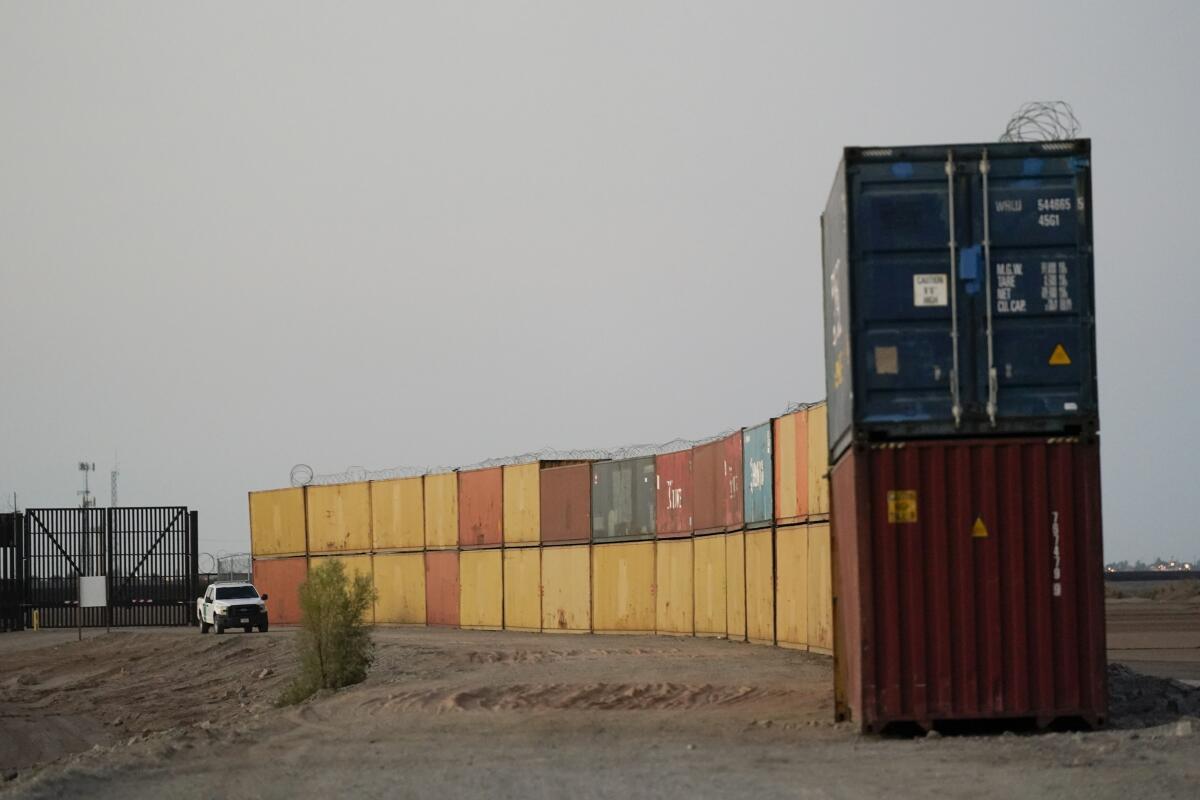Federal government tells Arizona to remove wall of shipping containers at border

- Share via
PHOENIX — The federal government is demanding that Arizona remove double-stacked shipping containers placed to fill gaps in the wall along the U.S.-Mexico border, saying they are unauthorized and violate U.S. law.
The Cocopah Indian Tribe in southwestern Arizona welcomed the call to take down the containers in the latest rift between the Biden administration and Republican-led border states over how to prevent illegal border crossings.
In a letter last week, the federal Bureau of Reclamation also demanded that no new containers be placed. It said the bureau wants to prevent conflicts with two federal contracts that have been awarded and two more still pending to fill border wall gaps near the Morelos Dam in the Yuma area.
“The unauthorized placement of those containers constitutes a violation of federal law and is a trespass against the United States,” the letter states. “That trespass is harming federal lands and resources and impeding Reclamation’s ability to perform its mission.”
There was no immediate response Monday from Republican Gov. Doug Ducey’s office, but it has said in the past it would remove the containers if the U.S. government starts construction to fill the gaps.
The tribe complained last month that the state acted against its wishes by placing 42 of the double stacks on its land near Yuma to halt illegal border crossings in an area that has become a major entry point for migrants.
“We believe the Bureau is taking the necessary and appropriate action to resolve this issue,” the Cocopah tribe said in a statement distributed Monday. “Beyond that, we will continue working side-by-side with local, state and federal law enforcement on securing the border.”
Ducey ordered the installation of more than 100 double-stacked containers over the summer, saying he couldn’t wait for U.S. Customs and Border Protection to award the contracts it had announced for work to fill the gaps in the border wall in the Yuma area.
Migrants, meanwhile, have continued to avoid the recently erected barriers by going around them, including through the Cocopah Reservation.
The border wall promoted by former President Trump continues to be a potent issue for Republican politicians hoping to show their support for border security.
President Biden halted wall construction his first day in office, leaving billions of dollars of work unfinished but still under contract. Trump worked at the end of his term to extend the wall to more than 450 miles, nearly a quarter of the border.
The Biden administration has made a few exceptions for small projects at areas deemed unsafe for people to cross, including the gaps near Yuma.
The quibble over the containers close to Yuma underscores the obstacles faced when constructing barriers on the border. Building on tribal land, including in the Tohono O’odham Nation in Arizona, can provoke opposition. Landowners, especially in Texas, where much property is privately owned, also can refuse to sign off on construction.
Ducey, like fellow Republican Gov. Greg Abbott of Texas, has often sparred with the Democratic Biden administration over immigration policies. Both states in recent months have been offering free bus rides to the East Coast for asylum seekers who are released in the United States to pursue their cases.
Florida Gov. Ron DeSantis arranged private flights of Venezuelans from San Antonio to Martha’s Vineyard, Mass.
“Arizona did the job the federal government has failed to do — and we showed them just how quickly and efficiently the border can be made more secure — if you want to,” Ducey said when the containers were installed in southern Arizona.
Associated Press writer Elliot Spagat in San DIego contributed to this report.
More to Read
Sign up for Essential California
The most important California stories and recommendations in your inbox every morning.
You may occasionally receive promotional content from the Los Angeles Times.













